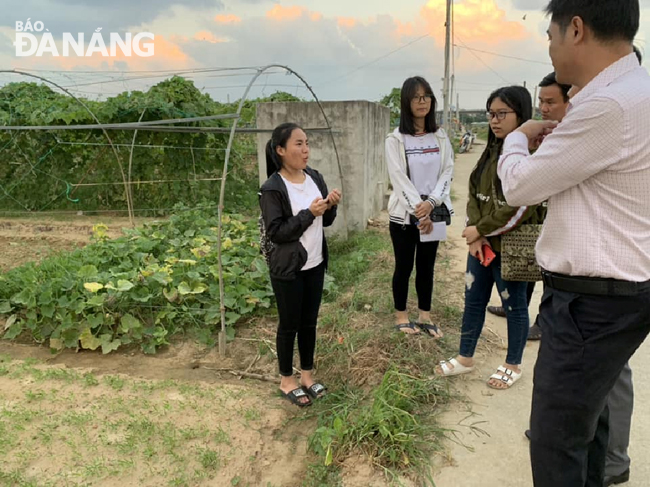Fully tapping potential from agritourism
Most recently, Da Nang has seen an upward trend in the number of travel companies who have started to exploit huge potentials of agritourism. This new kind of tourism is very inviting to international tourists, especially those from European countries and the USA.
 |
| Vegetable growing areas become new and attractive tourism products in the locality. |
Mr Nguyen Son Thuy, the General Manager of the Indochina Unique Tourist Co Ltd, remarked his company was a pioneer in launching an eco-tour to the La Huong vegetable growing area in Cam Le District.
As part of the tour, visitors will be taken to visit the area and Mrs Lieu’s ‘banh kho me’ (dried sesame seed cakes) making village, as well as to go shopping at a rural market.
“Currently, my company finds it very hard to improve the infrastructure at its vegetable growing area because this place often becomes submerged in water after heavy rains ,” he noted.
He, therefore, suggested that the city should expand space for tourism into Hoa Vang District, and develop more new and environmentally-friendly tourism products which adapt to the tastes of foreigners. These projects should be implemented under the public-private partnership.
Mr Thuy also undertook the importance of the promoting the development of agritourism in combination with ensuring the environmental sanitation and persevering community cultural space there.
Sharing the same idea in developing agritourism model for visitors from European countries, Mr Le Thien Tu, Director of VEI Tourism Co Ltd, said combining agricultural production with tourism has been developed in Quang Nam Province’s Hoi An and Thua Thien Hue Province.
Likewise, Da Nang boasts many beautiful rural areas such as Hoa Chau Commune’s Phong Nam Village, Hoa Phong Commune’s Tuy Loan Village, and Hoa Bac Commune’s Nam Yen Village.
He, therefore, underlined the significance of fully tapping the city’s available potentials for developing ecotourism tours such as riding bikes, rowing coracles, walking and cooking.
According to Mr Do Van Tan, Head of Hoa Vang District’s Culture and Information Office, in recent years, farmers have grown different types of high economic value vegetables, fruits and flowers in addition to imported products. Most notably, vegetable and flower growing areas across the city have created eye-catching artificial spaces which have drawn much attention from people.
Mr Tan remarked some local travel agencies have actively become involved in organising eco-tourism tours for pupils. Accordingly, they will be introduced by experienced farmers to different steps of tending to vegetables such as collecting seaweeds to use as organic fertilisers, hoeing the soil, sowing the seeds, and harvesting the vegetables.
In recent years, Hoa Vang District has seen numerous positive results in promoting the development of agritourism. In the coming time, the district authorities will make every effort to further advertise the potential for local agrictourism development, and appeal for even more investors to pour their money into ecotourism projects in a bid to boost the tourism sector.